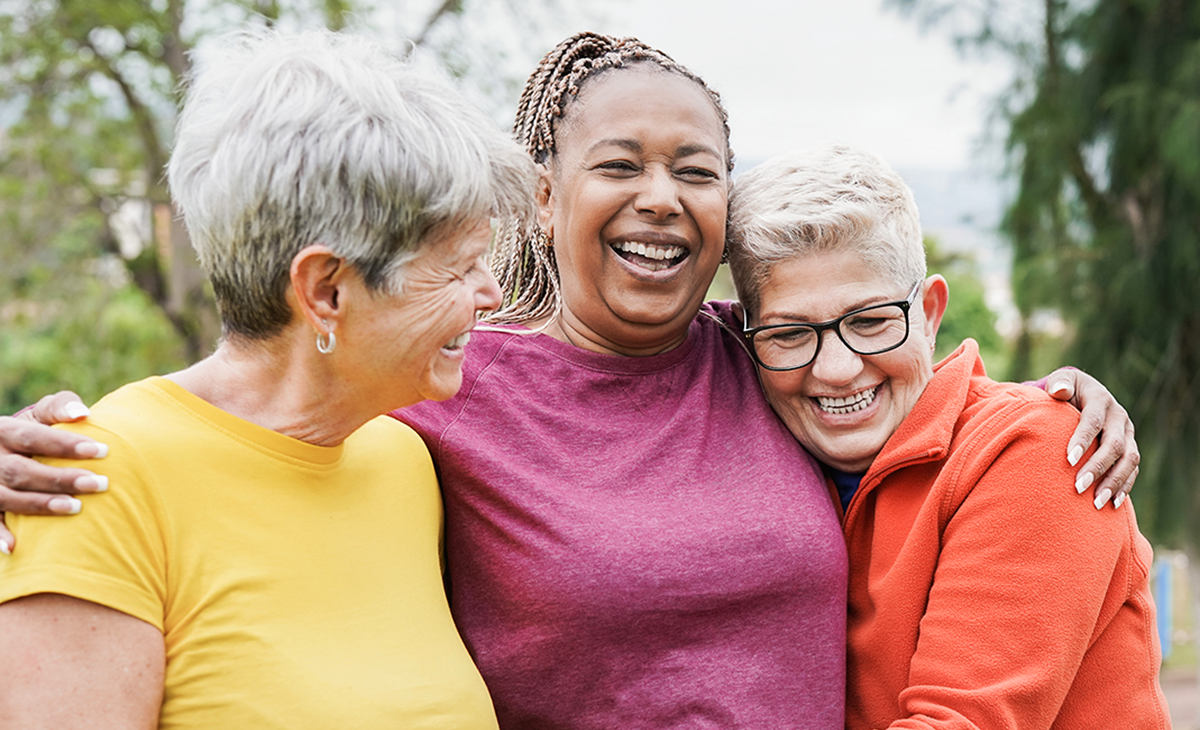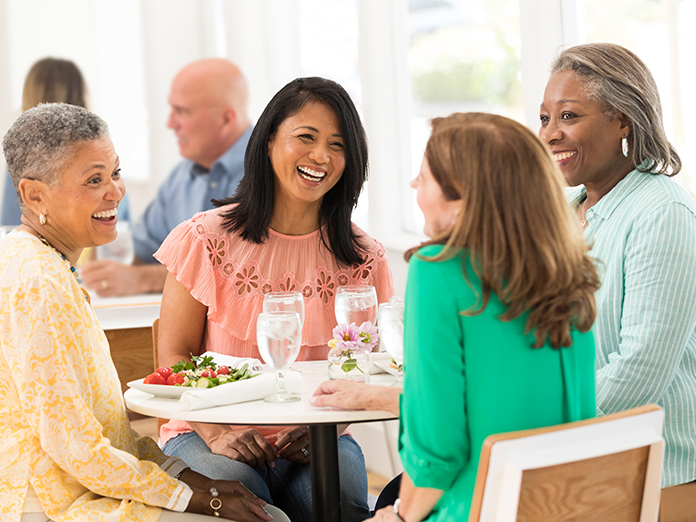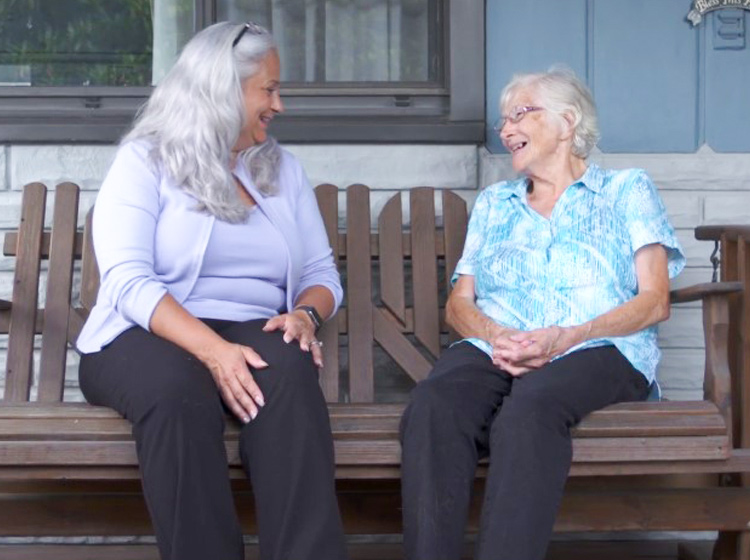The information you will be accessing is provided by another organization or vendor. If you do not intend to leave our site, close this message.
The importance of friends as you age
 By Bonnie Vengrow
By Bonnie Vengrow

At 77, Claire McGinnis has an enviable social life. It includes monthly dinners and annual holiday parties with various groups of friends, trips to New York City with coworkers, and cruises and getaways with neighbors. Needless to say, her calendar is always full.
And that’s exactly how this lifelong social butterfly likes it. Being with friends isn’t just fun for Claire — it’s also essential to her well-being. “There’s nothing like having a friend in your life,” she says. “I think it’s so good for your health, no matter how old you are.”
Of course, forging new friendships during your golden years may require a little extra effort. As you get older, common life changes can take their toll on your social life and, by extension, your well-being. These changes may include:
- Loss of a spouse
- Loss of hearing or vision
- Retirement
- Issues with health and mobility
Loneliness has been linked to a higher risk of cognitive decline, dementia and depression. It’s also been linked to heart disease, stroke and high blood pressure. In fact, a 2021 study1 concluded that social isolation significantly increased a person’s risk of premature death from all causes.
Bottom line? Friends are essential.
Good for the mind, body and spirit
That friendships improve physical and mental health isn’t news to John Moore, DO. Dr. Moore is an Aetna® Medical Director and senior health specialist. During his 17 years of practice, he saw a marked difference in the health outcomes of older patients who were socially active compared to those who weren’t. The difference was especially clear among people who had complex, chronic conditions like diabetes or emphysema. These conditions required that they stick to a daily regimen of medications and healthy routines.
“Patients who were socially engaged tended to have better outcomes despite their complex conditions,” says Dr. Moore. “They could have diabetes, chronic obstructive pulmonary disease, congestive heart failure, or all three things, and still be doing better. That’s because of their improved mental health, their regular social activities, and their dedication to taking care of themselves so that they could continue their regular social activities.”
Research supports his observations. Just as loneliness can hurt our health, friendships can actually improve it. And in far-reaching (and sometimes surprising) ways. Studies have found socializing can:
- Lower inflammation2
- Lower blood pressure and the risk of heart disease3
- Boost our mental health4
- Help us get a better night’s sleep5
- Help us live longer6
What’s more, friends can motivate us to adopt healthy habits. That’s what Marshall Cummings found when he began working out with buddies he made at the gym. “One day, I met a man in the locker room who used to be a gymnast when he was younger, and we hit it off,” says the 67-year-old New Jersey resident. “He gave me pointers on working out, and one day a week we’d do supersets together. That’s when you do three exercises in a row without stopping. I also started lifting more weight because some other friends encouraged me to. I was lifting more than I ever would have on my own.”
Friends can also help you keep your health on track, says Dr. Moore. “It’s friends and family who care about you and remind you of things you need to do, like a mammogram or colonoscopy or yearly physicals or eye exams,” he says. “They may also notice when you’re developing hearing or vision loss or need a walker or cane. And you may not even realize that until they point it out to you.”
Making new connections
When it comes to building a social circle, experts suggest finding people who are supportive and share your interests. Here are some good ways to meet new people:
Volunteer. Pitching in to help others isn’t just good for your community. It’s also a chance to get out of the house and enjoy face-to-face interaction. If you’re an Aetna Medicare Advantage member, you have access to Resources For Living®. Resources For Living can help you find volunteering opportunities in your community.
Take a class. Always wanted to learn how to speak Italian or improve your piano playing skills? A class can give your brain a workout and introduce you to potential study buddies. You can frequently find classes by searching online for topics that interest you. If you’re not sure where to get started, check out local organizations such as the YMCA. Ask about what kind of classes they provide.
Join a gym. Claire McGinnis credits her local gym with keeping her fit and introducing her to a host of new friends. The women meet once a month for lunch and get together every Christmas to celebrate. Workout classes also helped Donna Innamorati, 71, create a social network after she and her husband retired to Florida. “We stand around before class chitchatting,” she says. “And when my friends come into class in the morning and I see them, they have a big smile. It’s nice to see people you know.” (Some Medicare plans include Silver Sneakers, a no-added cost membership to a participating gym or fitness location. Check your plan to see if you’re eligible.)
Get moving. If the gym’s not your scene, try an activity that will get you out of the house and moving around. Dr. Moore recommends seniors do aerobic exercise three times a week, ideally with a friend. “Take a dance class, go bowling, play golf —do something where you’re having a good time and engaging with others,” he says.
Get involved with your faith community. If you’re religious, check out events happening at your local place of worship. Many offer social gatherings designed specifically for seniors.
Tap into social media. Sites like Facebook can help you find and reconnect with old friends.
Get a part-time job. Besides keeping your skills sharp, a gig can provide you with an important social outlet.
Keeping friendships alive
Nurturing friendships takes effort at any age. To keep yours in good order, it helps to make socializing part of your routine. Claire, for example, regularly texts or calls friends to say she’s thinking about them. She’s also a big fan of setting up the next get-together when she’s on the first one and believes in establishing standing dates. For instance, she has lunch with a friend from high school every three months, and five times a year attends Philly Pops performances with her husband and another couple.
Socializing is also a top priority for Marshall. After retiring to a town about a half-hour away from his family, friends have become his main source of support. He regularly has lunch or dinner with people from his old job and occasionally vacations with a close friend or two. “Even though I depend a lot on myself,” he says, “sometimes I do need that friend to call me up and tell me to get my behind up and go outside, to be more active.”
“You know, I think if you’ve got one good friend in your life, you’re a blessed person,” he adds. “Because that person will be with you through thick and thin. They’ll say, ‘I’ll be there for you.’”
1Naito R, Leong DP, Bangdiwala SI, et al. Impact of social isolation on mortality and morbidity in 20 high-income, middle-income and low-income countries in five continents. BMJ Global Health. March 22, 2021. Available at: https://gh.bmj.com/content/6/3/e004124. Accessed March 1, 2023.
2Ohio State University. Giving social support to others may boost your health. ScienceDaily. November 22, 2021. Available at: https://www.sciencedaily.com/releases/2021/11/211122135407.htm. Accessed May 20, 2022.
3Golaszewski NM, LaCroix AZ, Godino JG, et al. Evaluation of Social Isolation, Loneliness, and Cardiovascular Disease Among Older Women in the US; JAMA Netw Open. 2022;5(2):e2146461. Available at: https://jamanetwork.com/journals/jamanetworkopen/fullarticle/2788582. Accessed March 1, 2023.
4Peggy J. Liu, SoYon Rim, Lauren Min, et al. Journal of Personality and Social Psychology: Interpersonal Relations and Group Processes .The Surprise of Reaching Out: Appreciated More Than We Think. May 15, 2022. Available at: https://psycnet.apa.org/doiLanding?doi=10.1037%2Fpspi0000402. Accessed March 1, 2023.
5Amie M. Gordon, Belinda Carrillo, Christopher M. Barnes. Sleep and social relationships in healthy populations: A systematic review, Sleep Medicine Reviews, Volume 57, 2021. Available at: https://doi.org/10.1016/j.smrv.2021.101428. Accessed March 1, 2023.
6Lu Peigi, Oh Jeewon, Leahy Katelin, et al. Friendship Importance Around the World: LInks to Cultural Factors, Health, and Well-Being. Frontiers in Psychology. 2021. Available at: https://www.frontiersin.org/articles/10.3389/fpsyg.2020.570839. Accessed March 1, 2023.
About the author
Bonnie Vengrow is a journalist based in NYC who has written for Parents, Prevention, Rodale’s Organic Life, Good Housekeeping and others. She’s never met a hiking trail she doesn’t like and is currently working on perfecting her headstand in yoga class.



